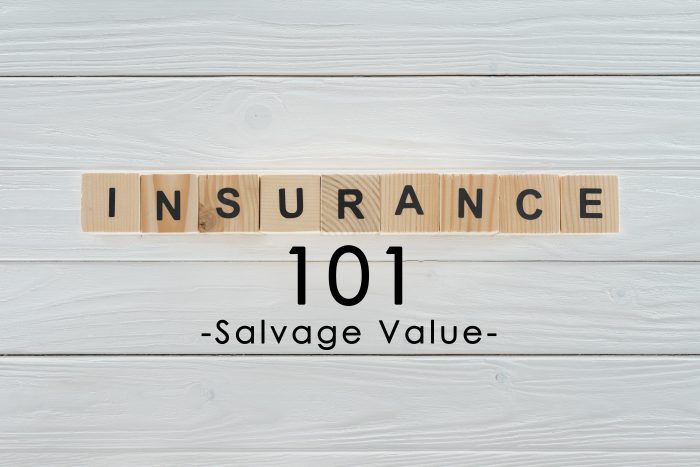Insurance Term of the Day: Salvage Value

The insurance company will use salvage value when your car is a total loss, and you decide to buy it back from them.
When you are in a car accident, a claims adjuster will come view your automobile and assess the damages. If the cost of the damages is three quarters the total value of your car, the adjuster will total out your car. Then, they will offer you the fair market value of your car. However, it is possible that even if the car is totaled, it is still driveable. By law in most states, insurance companies still have to total out the car even if it’s driveable when the damage costs exceed the value. In this case, you can make the decision to keep the damaged car, which is technically considered buying the car back from the insurance company.
The reason for your insurance is for the company to support you financially if something happens to your car. When you file a claim, they are buying your car and offering you the fair market value. When you choose to keep your car, instead of paying the fair market value of the car, they’ll keep a percentage of the total value. This is what’s called the salvage value, which is what the car would be worth if sold for parts. It’s the scrap value of the materials that it can be broken down into. The condition of the operating parts and body parts is taken into consideration when determining the value. The insurance company will determine the actual cash value (ACV) of the car and deduct a certain amount for the salvage value.
When you give your car to the insurance company, this is how the value is determined. ACV – deductible = amount paid.
When you decide to buy your car back from the insurance company, this is how the value is determined: ACV – your deductible amount – salvage value percentage = amount you are paid out on the claim.
Choosing to buy your car back from the insurance company basically means that your car is not of value anymore. In some cases, you will receive what’s called a salvage title, which states that your car has been deemed a total loss by an insurance company. Typically, after a car is deemed totalled, your insurance company will not allow you to add comprehensive/collision coverage on your policy. This means that if you are in another accident following the first, your car is not valuable, and you will receive little or nothing on a payout.
Do you have questions about your insurance? Find an insurance agent near you with our Agent Finder
Search All Blogs
Search All Blogs
Read More Insurance Blogs
New Life, New Responsibility: Why a February Arrival Means Updating Your Policy
Welcoming a new family member this February? It’s time to move life insurance to the top of your to-do list to ensure your child’s future is secure.
A Presidential Legacy: Using Life Insurance to Fund Your Charitable Vision
What will your legacy be? Learn how to use life insurance to make a significant charitable impact this Presidents’ Day without depleting your current savings.
A Gift Beyond Roses: Why Life Insurance is the Ultimate Expression of Valentine’s Day Love
Roses fade, but financial security lasts. Discover why life insurance is the most selfless Valentine’s Day gift you can give your family this year.
T-Minus 30 Days: The Late January Review of Beneficiaries and Tax Implications
Tax forms are here. Review your life insurance beneficiaries one last time, and understand the tax status of policy payouts vs. accrued interest.
The Mid-January Check-Up: Why Scheduling Your Life Insurance Exam Now Locks in the Best Rate
Don’t delay the exam! Schedule your Life Insurance paramedical exam in mid-January to lock in your best rate and complete your application process quickly.
Tax Season Lifeline: Why January is the Time to Secure Estate Liquidity with Life Insurance
Tax season is here. Use Life Insurance to create tax-free liquidity for your estate and protect your family business from forced asset sales.
The Healthy Policy: Leveraging Your January Wellness Resolutions for Life Insurance Savings
Did you resolve to get healthier? Your improved fitness can translate into lower life insurance premiums in the new year.
The Family Legacy: Why December is the Time to Name a Trust as Your Life Insurance Beneficiary
Protect your payout. Discover the benefits of naming a Trust as the beneficiary of your life insurance to control distributions and minimize probate delays.
The Most Sustainable Gift: Life Insurance and the Value of Income Continuation Planning
Life insurance ensures the Christmas cheer continues. Practical tips on using income continuation math to calculate the right term policy size for your family.
The Ultimate December Gift: Why Life Insurance is the Most Important Present You’ll Ever Give
Forget the gadgets; life insurance is the real gift of security. A timely look at protecting your family’s future during the season of giving.










